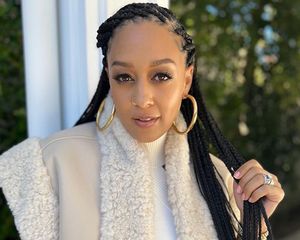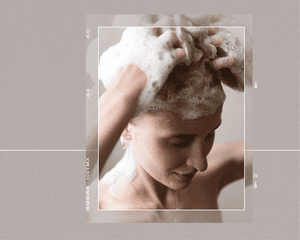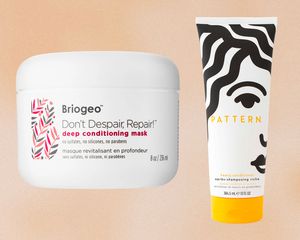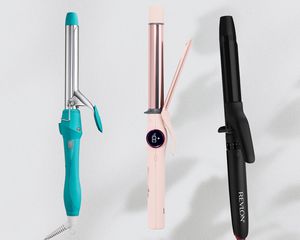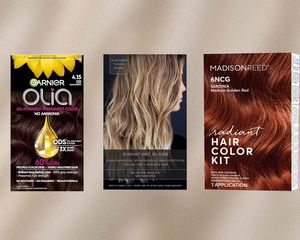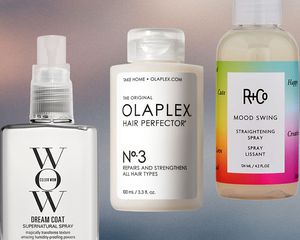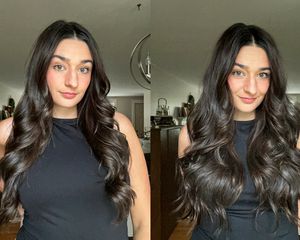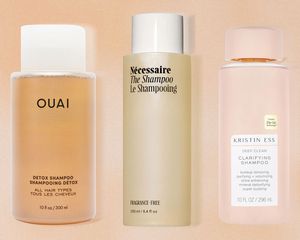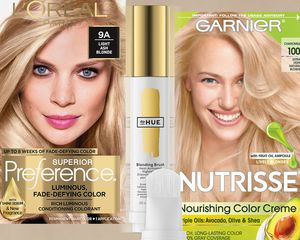:max_bytes(150000):strip_icc()/253479608_389971366156531_7534540629310987281_n-a0f9623f3488487bb329d358ebf0f28b.jpeg)
@freshlengths
Looking after natural hair can feel a little overwhelming from time to time, simply because our hair goes through so much. From daily styling to sun exposure and the occasional use of heating tools, it's no wonder that many naturals find solace in their wash day routines. Wash days teach us all how to give our hair the care it deserves.
One important element of caring for natural hair that should never be overlooked is conditioning. Conditioners help prevent damage from heat and styling tools and replace moisture and proteins in the hair shaft. When hair is conditioned, its strength, shine, and overall health are restored, which is why no haircare routine is complete without a good conditioner.
So we asked hairstylist Charlotte Mensah, trichologist Kari Williams, Ph.D., and Jeanette Nkwate of the natural hair care brand Afrocenchix to help us break down everything there is to know about conditioning natural hair, including the different types of conditioners to choose from and how to pick a conditioner based on the factors that impact natural hair on a daily basis.
Meet the Expert
- Charlotte Mensah is an award-winning hairstylist and author and the founder of the Manketti Oil hair care range.
- Kari Williams, Ph.D., is a trichologist and hairstylist. Her clients include Halle Berry, Chloe Bailey, and Ava DuVernay.
- Jeanette Nkwate is a content, community, and communications manager for the award-winning hair brand Afrocenchix.
Why Conditioner Is Crucial
For naturals who either don't use a conditioner as part of their hair care routine or aren't sure which conditioner is right for them, it can be beneficial to know why natural hair needs to be conditioned on a regular basis. "Afro-textured hair absorbs liquid and moisture like a sponge, however, it can struggle to retain that moisture," Mensah says. "Finding a good conditioner that contains ingredients like oils is a must, as they can form a protective layer on the hair and support the detangling process."
Additionally, the natural twists and bends in the hair shaft can create cracks in the cuticle which makes natural hair drier and more fragile than other hair types. "In order to keep hair healthy and prevent damage, the regular infusion of moisture and protein into the strands is important," Williams explains.
Types of Conditioners
Instant
Deemed to be more suitable for type 3 hair, instant conditioners provide a variety of benefits such as reducing dryness and aiding in detangling. "Instant conditioners tend to be applied shortly after shampooing for a little time before rinsing out," Mensah says. There are some instant conditioners that don't need to be rinsed out, which is why they can be confused with leave-in conditioners.
To avoid product build-up, Williams recommends using instant conditioners only occasionally, as using this type of conditioner "will not keep hair in its optimum condition," she says.
Deep
Deep conditioning has become an essential part of most naturals' hair care routines, but all hair types can benefit from using a good deep conditioner on a regular basis. "A deep conditioner is a hair mask or intense hair treatment formulated with key conditioning agents like emollients, humectants, and fatty alcohols—they restore the hair's moisture levels as well as reduce breakage and improve elasticity," Mensah says.
"Deep conditioners should be left on the hair for a minimum of 10 minutes," Williams says. "I recommend deep conditioning every time you shampoo." In order for hair to be deep conditioned, the product needs to penetrate deeper within the hair shaft. The process must be activated by heat in order to give hair the TLC it needs.
Leave-in
Particularly great for tighter curls and coils, leave-in conditioners provide extra moisture to the hair as well as protect it from damage. They can also help facilitate the detangling process. "All hair types can benefit from the use of leave-in conditioners, particularly if you have dry, damaged, or frizzy hair," Mensah says. If you use heat-styling tools like curling or straightening irons on a regular basis, your strands may benefit from using a leave-in.
Something to note about leave-in conditioners is that they were formulated to be used after hair is washed and before it is styled, so they do not need to be rinsed out. As such, naturals who apply leave-in conditioner regularly should be mindful of scalp build-up. "You should aim to wash your hair every seven to 10 days using a mild, sulfate-free shampoo," Nkwate says. "This will remove any buildup, sebum, dirt, and dust."
Protein
"Protein conditioners rebuild the damage that has occurred to the hair follicle. They can also help in decreasing hair shedding," Mensah says. As well as repairing hair damage, protein conditioners strengthen hair with the help of ingredients like hydrolysed protein and ceramides.
Before using a protein conditioner, be sure to determine whether your hair actually needs protein. If you are unsure, book a consultation with a stylist. "Hair that is fragile, breaking excessively, limp or lacking elasticity needs a protein conditioner," Williams says. "However, this type of conditioner should not be used often because excessive use can cause the hair to become dry and brittle."
Moisturizing
Moisturizing conditioners add moisture to the hair which softens and nourishes it, making it easier to manipulate. "They are infused with extra conditioning agents such as oils, butters, humectants, and other moisturizing ingredients that are beneficial for limp and lifeless hair," Mensah says. In addition to rejuvenating hair, moisturizing conditioners provide hydration, improve elasticity, and add shine.
Repair
"Any hair type that has been exposed to excess heat, pollution, or damaging treatments like coloring could benefit from a repairing conditioner," Mensah says. Repairing conditioners strengthen and hydrate injured strands to restore sheen and stop further hair damage. When using a repairing conditioner, remember that results are key. Although it takes time to reverse hair damage, don’t be afraid to switch to a different conditioner if it hasn’t produced the results you desire.
Factors to Consider
Hair Density
Type 4 hair comprises densely packed coils, so it can be beneficial to know what type of conditioners can help maintain moisture and avoid those dreaded tangles. "Hair density is the number of individual strands per square inch on your scalp. For dense hair, I would recommend using conditioners with heavier hold, so anything that comes in a cream or butter form as this helps hold strands together and minimize puffiness," Mensah says. Williams recommends volumizing conditioners for curly hair types as they plump strands and create a fuller look for hair.
Climate
Contrary to what some people may believe, both hot and cold weather can impact the overall health of your hair. According to Mensah, summer hair for naturals should always be carefree. "Use moisturizing shampoos and conditioners to counteract the dehydration caused by the heat," she says. "Wear a hat or scarf while in the sun and look for products with UV filters, vitamins, and antioxidants to protect your hair from the sun." Natural hair can be prone to damage in cold weather climates; Mensah recommends prioritizing moisture to keep hair healthy.
Frizz
Frizz occurs when hair strands look neither straight nor curly. It gives hair an irregular texture that makes it divert from the natural pattern of the rest of the hair. "Curly and afro-textured hair is more vulnerable to frizz compared to straight hair types," Mensah says. "This is because curly hair is more porous with a lack of sebum distribution and lubrication along the length." She recommends using leave-in and moisture-rich conditioners to combat frizz. She also recommends minimizing the use of hot tools and air drying hair as often as possible.
Product Build-up
When wearing a protective style (such as braids or a weave), it’s easy to neglect our natural hair. Although stylists do recommend applying product to your hair while it’s styled, build-up can occur if too many products are applied at one time. Mensah recommends her soon-to-launch Manketti Oil Exfoliating Scrub: "It's brilliant at removing build-up. It keeps the scalp clean, promotes growth, and brings more oxygen and blood circulation to the scalp," she says.
If you are concerned about product build-up, you might want to consider shampooing your hair to be on the safe side. Nkwate recommends then rubbing your scalp with a scalp oil. "This will compensate for the sebum lost while shampooing," she says.
Excessive Heat
Heating tools can help naturals achieve a straighter look if desired. However, if you use tools that are kind to your strands, you're less at risk for hair damage. "Using heat does not automatically mean your hair is or will become damaged. As long as you use the right tools and have regular trims, you should be fine, "Mensah says. She recommends her Manketti Oil Conditioner which works from root to tip to prevent breakage, providing silky and soft results. Williams recommends DevaCurl's Recoiling Treatment Mask for those who want to repair any damage caused by heat.
Dryness
To combat dryness, Williams recommends using a deep or moisturizing conditioner. "Dryness causes fragile strands that can become susceptible to breakage, so protecting hair should be a top priority," she says. Mensah recommends taking a holistic approach to reversing signs of dry hair. "Feed your hair from the inside," she says. "Omega-3 fatty acids found in salmon and flaxseed oil can work wonders. Also, eat fresh fruit and wash your hair with a shampoo that has been formulated with dry hair in mind."
Damage
Dryness and damage usually go hand in hand. In order to treat and reduce both, it's crucial to determine the cause. "Damage is usually a result of excessive use of styling tools, chemicals (colors and straighteners), or certain hairstyles," Williams says. Once damage has been determined, an appropriate conditioner can be chosen. Mensah recommends regular deep conditioning treatments and trims. "Hair damage is more than split ends—excessive shedding, flaking, or breakage are all indications that you need a check-up. If your hair is damaged, avoid heat styling completely," she says.
Loss of Elasticity
If your hair isn't able to return to its original length without breaking, then it is likely that your hair has lost its elasticity. "The loss of elasticity is a result of dryness", Williams says. "A moisturizing conditioner can help; However, if too many softeners have been used on the hair, a protein conditioner should be used instead," she says. As well as ensuring your hair has a balance of protein and moisture, Mensah recommends using hydrating products. "They can help strengthen and increase your hair's elasticity," she says.
Chemical Treatments
Williams recommends deep conditioning treatments with moisturizing conditioners for chemically-treated hair. "Conditioners for color-treated hair should be used to maintain its vibrancy as long as possible," she says. She also recommends keeping chemically-treated hair strong by incorporating reconstructing or protein treatments into the conditioning regime: "This will keep the hair strong and prevent damage."
According to Mensah, those with relaxed hair should always maintain high standards of care. "Use a mask regularly to boost your strands with moisture and shine and use a silk scarf or pillowcase at night to provide your hair with extra protection," she says.
The Final Takeaway
Natural hair is incredibly versatile, and we all take pride in experimenting with different styles from time to time—however, if the right care or approach isn’t taken, our hair can become fragile and prone to breakage. Before you invest in a good quality conditioner, take some time to think about your hair’s specific needs, and always consult with a stylist if you are unsure.
